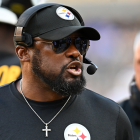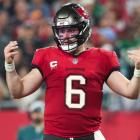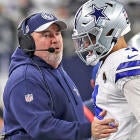It's safe to assume that Super Bowl XLVII didn't go exactly as planned -- for almost everyone involved. San Francisco didn't show up until the second half -- after the Superdome lost power -- precisely when Baltimore began a near-epic meltdown. But the Ravens held on to win one of the most electrifying Super Bowls in recent memory 34-31.
| More on Super Bowl XLVII |
| Columns |
    |
| Related links |
|
| More NFL coverage |
|
Here are some numbers to remember.
1: The number of interceptions San Francisco has thrown in six Super Bowls. Colin Kaepernick’s overthrow in the second quarter that Ed Reed picked off was the first. Joe Montana did not throw any in his four Super Bowls, and Steve Young was flawless in his only Super Bowl. Kaepernick almost threw a second one later in the second quarter.
3: The number of times San Francisco fell behind 7-0 in the first five minutes in its three playoff games. The 49ers overcame a Kaepernick pick-6 on the opening series against Green Bay and a 17-0 deficit at Atlanta in the NFC Championship Game. The 49ers almost came back from a 28-6 deficit this time -- the largest rally in Super Bowl history was 10 points -- but fell 5 yards short.
4: The number of times in the last five games the 49ers allowed 21 or more first-half points -- Seattle (28), Green Bay (21), Atlanta (24) and Baltimore (21). By their standards, that’s an epic collapse. They never gave up 21 points in the first half in coach Jim Harbaugh’s first 32 games.
5: The number of yards an illegal formation cost the 49ers on their opening possession, and the number of yards linebacker Ahmad Brooks cost the 49ers on Baltimore’s opening possession by jumping offsides. It set a terrible tone. The illegal formation cost San Francisco a 20-yard completion to tight end Vernon Davis, and the possession ended in a three-and-out. The offside turned a third-and-9 for Baltimore into a third-and-4 at the San Francisco 13, and the Ravens capitalized with a 13-yard TD pass to go ahead 7-0.
6: The number of third-down conversions the 49ers allowed in eight first-half attempts. The Ravens converted two third-and-4s, two third-and-1s, a third-and-7, and a third-and-10, including two that were passes for TDs.
7: In his final game, Ray Lewis had seven tackles -- his lowest output of the postseason.
9: Ravens safety Ed Reed swiped his ninth career postseason interception, tying him with Charlie Waters, Bill Simpson and Ronnie Lott for most in playoff history.
11: More Flacco. The quarterback joined Joe Montana and Kurt Warner as the only players to throw 11 touchdowns in a single postseason. Only Montana achieved the feat without throwing a pick.
15: Not quite as impressive as Jones' play, but historical nonetheless, was Colin Kaepernick's 15-yard touchdown run -- the longest rushing score by a quarterback in Super Bowl history.
31: The 49ers tied the record for most points in a losing effort, tying the Cowboys who lost 35-31 in Super Bowl XIII. Oddly, a team has scored 31 points in three of the last four Super Bowls.
34: The number of minutes the game was delayed by a power outage in the third quarter, with the 49ers facing a third-and-13 at their 40 and trailing 28-6. They did not get the first down when play resumed, but after forcing a three-and-out on the Ravens’ next possession, they scored three touchdowns and a field goal the next four times they had the ball to close the gap to 28-26 with 9:57 left and almost completed an incredible comeback.
67: The number of rushing yards on four carries for Frank Gore in the fourth quarter after he gained 43 yards on 15 attempts in the first three. His 21-yarder to the 18 set up a TD, and his 33-yarder to the 7 put them in position to go ahead. They didn’t give the ball to him again, and they didn’t score.
104: The number of receiving yards for Baltimore’s Anquan Boldin on six catches. Every one of them were big, particularly a third-and-1 grab in the fourth quarter with cornerback Carlos Rogers all over him that extended a Ravens drive and allowed them to kick a field goal to go up 34-29 with 4:19 left.
108: The number of yards Jacoby Jones ran untouched for a Baltimore touchdown on the second-half kickoff, falling shy of the longest scoring play in history in Super Bowl history. He did not have a huge crease but streaked through it and was gone a second later. The 49ers had not allowed a kickoff return for a score in Harbaugh’s two years as coach. Jones also became the second player in NFL history to score on a kick return and reception in the playoffs, joining Kansas City's Dante Hall.
126: Ravens quarterback Joe Flacco threw 126 consecutive postseason passes without an interception, which is an NFL record.
RapidReports reporter Evan Hilbert contributed.
For more NFL news, rumors and analysis, follow @EyeOnNFL on Twitter, subscribe to our RSS Feed, watch Pro Football 360 daily at 3 p.m. ET and NFL newsletter. You can also follow Evan Hilbert @evanhilbert.

















